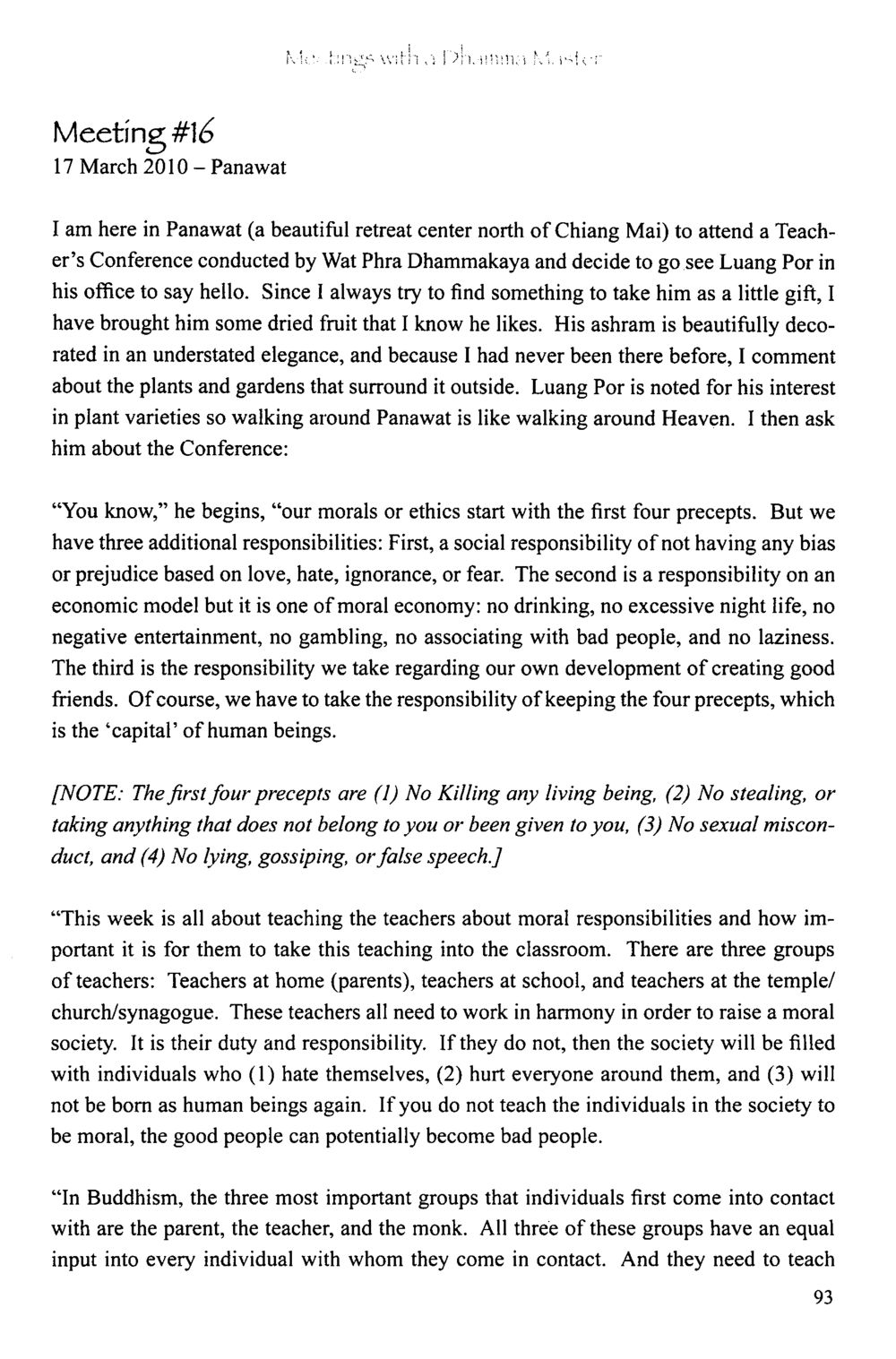Teacher’s Conference Insights on Moral Responsibilities at Panawat : หน้า 94/164
The Meeting with a Dhamma Master : หน้า 94/164 Explore the key insights from a Teacher’s Conference held at Panawat regarding moral responsibilities and ethical teachings.
1 ครั้ง

สรุปเนื้อหา
ในการประชุมครูที่ Panawat ได้เน้นถึงความสำคัญของหน้าที่และจริยธรรมในสังคม พร้อมกับการสอนศีลธรรมในโรงเรียน วัด และที่บ้าน ที่สำคัญคือการทำงานร่วมกันของครูทุกกลุ่มเพื่อสร้างสังคมที่มีคุณธรรม โดยเน้นการปฏิบัติตามศีล 4 ประการ ได้แก่ ห้ามฆ่าชีวิต, ห้ามขโมย, ห้ามผิดศีลธรรมทางเพศ, และห้ามพูดเท็จ. หน้าที่ของผู้ปกครอง, ครู, และนักบวช มีส่วนสำคัญในการสอนและพัฒนาแต่ละบุคคลให้เป็นคนดี.
หัวข้อประเด็น
-จริยธรรมและความรับผิดชอบ
-การสอนในสังคม
-บทบาทของผู้ปกครอง ครู และนักบวช
-ศีล 4 ประการและผลกระทบต่อสังคม
ข้อความต้นฉบับในหน้า
Meeting #16
17 March 2010 - Panawat
I am here in Panawat (a beautiful retreat center north of Chiang Mai) to attend a Teacher’s Conference conducted by Wat Phra Dhammakaya and decide to go see Luang Por in his office to say hello. Since I always try to find something to take him as a little gift, I have brought him some dried fruit that I know he likes. His ashram is beautifully decorated in an understated elegance, and because I had never been there before, I comment about the plants and gardens that surround it outside. Luang Por is noted for his interest in plant varieties so walking around Panawat is like walking around Heaven. I then ask him about the Conference:
“You know,” he begins, “our morals or ethics start with the first four precepts. But we have three additional responsibilities: First, a social responsibility of not having any bias or prejudice based on love, hate, ignorance, or fear. The second is a responsibility on an economic model but it is one of moral economy: no drinking, no excessive night life, no negative entertainment, no gambling, no associating with bad people, and no laziness. The third is the responsibility we take regarding our own development of creating good friends. Of course, we have to take the responsibility of keeping the four precepts, which is the ‘capital’ of human beings.
[NOTE: The first four precepts are (1) No Killing any living being, (2) No stealing, or taking anything that does not belong to you or been given to you, (3) No sexual misconduct, and (4) No lying, gossiping, or false speech.]
“This week is all about teaching the teachers about moral responsibilities and how important it is for them to take this teaching into the classroom. There are three groups of teachers: Teachers at home (parents), teachers at school, and teachers at the temple/church/synagogue. These teachers all need to work in harmony in order to raise a moral society. It is their duty and responsibility. If they do not, then the society will be filled with individuals who (1) hate themselves, (2) hurt everyone around them, and (3) will not be born as human beings again. If you do not teach the individuals in the society to be moral, the good people can potentially become bad people.
“In Buddhism, the three most important groups that individuals first come into contact with are the parent, the teacher, and the monk. All three of these groups have an equal input into every individual with whom they come in contact. And they need to teach
หน้าหนังสือทั้งหมด

1

2

3

4

5

6

7

8

9

10

11

12

13

14

15

16

17

18

19

20

21

22

23

24

25

26

27

28

29

30

31

32

33

34

35

36

37

38

39

40

41

42

43

44

45

46

47

48

49

50

51

52

53

54

55

56

57

58

59

60

61

62

63

64

65

66

67

68

69

70

71

72

73

74

75

76

77

78

79

80

81

82

83

84

85

86

87

88

89

90

91

92

93

94

95

96

97

98

99

100

101

102

103

104

105

106

107

108

109

110

111

112

113

114

115

116

117

118

119

120

121

122

123

124

125

126

127

128

129

130

131

132

133

134

135

136

137

138

139

140

141

142

143

144

145

146

147

148

149

150

151

152

153

154

155

156

157

158

159

160

161

162

163

164
หนังสือที่เกี่ยวข้อง
Load More
